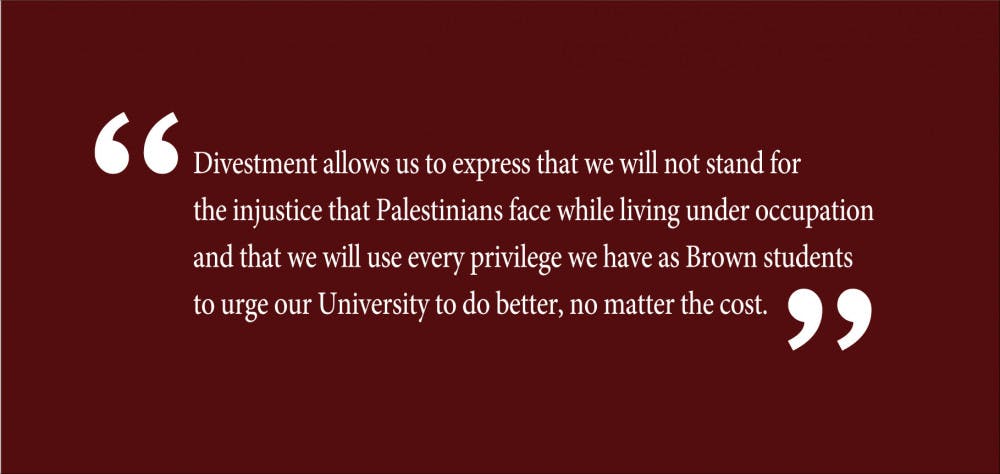In his column titled “Divestment has severe costs — and nobody is talking about them,” Anuj Krishnamurthy ’19 seeks to discredit Brown Divest and essentially places the University’s financial well-being over the ethics of being a stakeholder in companies that profit off the suffering of Palestinians.
While he claims to acknowledge the positivity of imbuing the University’s investment philosophy with moral and ethical considerations, Krishnamurthy then goes on to state, “Divesting from public companies involved in the repression of Palestinians, or any social ill, will not actually hurt those companies.” Even if we assume that divesting creates no economic repercussions, as Brown students, how can we be morally and ethically content with continuing the status quo of the University profiting from such companies?
Furthermore, if divesting does not have any repercussions on the targeted companies, then why is there such a ruthless struggle among politicians in this country seeking to criminalize BDS? According to the Guardian, “BDS has caused two dozen states to pass bills or issue orders inhibiting or penalizing those boycotting Israel or its settlements.” This does not even include the debate over the Israel Anti-Boycott Act introduced in Congress last year, which sought to prohibit American corporations from joining boycotts against Israel, restricting fundamental First Amendment rights.
You would not try to pass legislation against boycotts if you believed the act of boycotting would not have any repercussions.
Krishnamurthy then critiques Brown Divest’s calls for financial transparency and student oversight, saying that first, the investment managers should be maximizing profit for the University, not “gathering disparate information on the social and moral soundness of the thousands of companies in which the endowment is invested,” and second, that the investment managers cautiously safeguard their investments for competitive edge. The problem here is that once again, the ethics of where we invest matter, and that the moral soundness of the companies in which University money is invested does need to be evaluated.
Brown’s principal priority should be toward its students, and we deserve to know how funds are being invested. I can understand that Brown would want to keep its competitive edge with its portfolios, but in my opinion, Brown Divest takes that into account; it asks the University to “establish a means of implementing financial transparency.” The University could potentially find a way to establish financial transparency to its students without disclosing its portfolio to the general public and thus without risking its competitive advantage.
At the end of the column, Krishnamurthy writes, “Reformulating Brown’s portfolio will not fill Palestinian stomachs; it will not boost Palestinian wages; it will not spare innocent Palestinians from blockades, bulldozers and bullets.” Of course, a reformulation of Brown’s portfolio does not have the power to single-handedly achieve the aforementioned on its own. But the reformulation of Brown’s portfolio would allow the University to stay true to its commitment to refraining from supporting companies engaged in “social harm” as outlined by its Advisory Committee on Corporate Responsibility and Investment Policies charter. Divestment may not fill Palestinian stomachs, but a University decision to divest would send a strong message to our peer institutions, community members and Rhode Island politicians — with whom Krishnamurthy suggests critics of Israel should spend time lobbying — condemning the injustice and human rights violations committed in the occupied Palestinian territories.
Divestment may not single-handedly spare innocent Palestinians from blockades, bulldozers and bullets, but it allows us to express that we will not stand for the injustices Palestinians face while living under occupation and that we will use every privilege we have as Brown students to urge our University to do better, no matter the cost.
Luqmaan Bokhary ’21 can be reached at luqmaan_bokhary@brown.edu. Please send responses to this opinion to letters@browndailyherald.com and other op-eds to opinions@browndailyherald.com.



